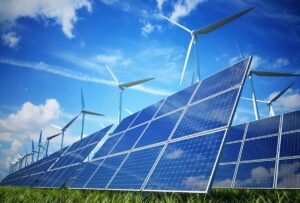
Ukraine after the war will be very interesting for private investors to develop renewable energy sources, said Harry Boyd Carpenter, managing director for climate strategy and implementation of the European Bank for Reconstruction and Development.
“There’s also going to be a huge wave of investment in renewable energy. Ukraine does have a success story because before the war there was an extraordinary boom in RE – 5 GW of privately financed renewable energy. And that’s the template for Ukraine in the future,” Carpenter said during a discussion on Ukraine’s transition from coal to clean energy ahead of the London Recovery Conference (URC2023), scheduled for June 21-22.
At the same time, according to him, Ukraine will also receive public sector money, but it should be spent primarily on the development of nuclear energy, as well as on construction and reconstruction of networks, to ensure, among other things, the work of decentralized system of renewable energy.
At the same time, the top manager of the EBRD called the commitment of Ukraine to abandon coal in power generation extremely important, noting that this course determines the further development of not only energy, but also the economy and the whole country.
He noted that the contours of the energy sector of Ukraine in the future are quite clear – it will be built on nuclear and renewable energy, and the country has huge resources in all these areas.
At the same time, Carpenter noted that RES used to develop under conditions of “imperfect market and tariffs”, calling it a difficult transition period, but expressed his belief that in the future their development will be based on three fundamental pillars that will remove these problems.
“The first will be a commitment to a green future (…). The second is market reforms. We need a well-functioning, transparent, clearly delineated market. And the third will be integration with the European energy system, which is already in full swing,” the EBRD top manager pointed out.
Besides, Carpenter assured that EBRD intends to continue to support Ukraine financially.
“We will provide Ukraine with EUR3 billion of support. And we are already halfway there. Much of this has come in the form of liquidity support for the energy sector – Naftogaz and Ukrenergo,” the banker emphasized.
Announcing URC2023 on June, 19 First vice-premier Yulia Sviridenko announced the goals in 10 years to show the new Ukraine and to reach over 100 GW of new green power generation capacity, to produce 40 million tons of “green” steel and to bring GDP to $1 trillion per year from $161 billion in 2022.
As reported, at the end of December 2022, NEC Ukrenergo, inter alia, attracted EUR300 million of credit funds from the EBRD to purchase equipment to restore substations subjected to massive Russian missile strikes, as well as to replenish working capital.
NJSC Naftogaz attracted a EUR300 million loan from the EBRD at the end of last year, and later, in early 2023, it received a grant of nearly EUR200 million for the purchase of gas.
According to the president of the bank, Odile Renaud-Basso, the EBRD in 2022 increased the amount of investment in projects in Ukraine to EUR1.7 billion compared to approximately EUR1 billion that it invested annually before. It plans to invest EUR3bn in Ukraine during 2022-2023.

Apartment buildings with established condominiums, housing and communal associations and private managing companies can get compensations of up to UAH 80 thousand for purchase of alternative energy sources, the head of the Kyiv council commission on housing and communal services and fuel and energy complex Alexander Brodsky said.
Brodsky said that the decision of the Kiev council “On some issues of preparation of the housing fund of Kiev for the passage of the winter period under martial law” came into force.
“This decision is aimed at supporting residential apartment buildings in Kiev, in which created condominiums, HCCs and for private management companies to purchase alternative (independent) energy sources (gasoline and diesel generators, uninterruptible power supplies, inverters, solar panels) to provide in-house systems, such as individual heating units, boiler rooms, duty lighting or recharge gadgets for co-owners,” Brodsky said on his Facebook page.
The deputy noted that a simple mechanism is provided: the house brings a bill of expenditure, an extract from the unified state register and submits an application to the chairman of the RGA.
“During the next two months, the city will reimburse 75% of the cost of such a source, but no more than 80 thousand hryvnia for one house. I hope that all participants will take advantage of this solution for the smooth operation of communications in their homes,” – wrote Brodsky.
Concerning houses that are still managed by former HMOs, in Brodsky’s words “each of the 10 management companies in districts has received 20 million UAH for the heating season, and by this decision we have achieved equality between houses of different management forms”.